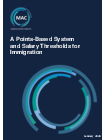Brexit and changes to the UK's immigration policy

The Migration Advisory Committee (MAC) announced a Call for Evidence in September 2019. This Call aimed to determine how proposed salary thresholds - set out in the Immigration White Paper 2018 - would fit within a ‘points-based’ immigration system as proposed by the Prime Minister in July 2019.
The UK left the European Union on the 31 January 2020.
 On 19 February 2020 the UK Government published a policy paper which sets out the new points-based immigration system that will take effect from 1 January 2021. This policy paper was informed by the evidence presented in the independent report produced as a result of the MAC's Call for Evidence.
On 19 February 2020 the UK Government published a policy paper which sets out the new points-based immigration system that will take effect from 1 January 2021. This policy paper was informed by the evidence presented in the independent report produced as a result of the MAC's Call for Evidence.
Key changes to the UK's immigration system set out in the policy paper are outlined on this page. You can find out how these changes relate to the evidence we submitted on this topic on our ‘Geoscience and the UK’s points-based immigration system’ web page.
UK immigration policy changes: at a glance
-
Free movement for EU citizens will end on 1 January 2021.
- EU and non-EU citizens will be treated as equal under new immigration rules.
- New policy aims to reduce overall migration to the UK.
- Entry will be granted under a points-based system (PBS).
- There will be no low-skilled or temporary work route to entry.
Salary and skills thresholds
- The proposed salary threshold of £30,000 will be lowered to £25,600 (on recommendation from the MAC).
- Migrants will be able to trade characteristics of their role or skills against the salary threshold (e.g. having a PhD will lower the salary threshold required).
- Allowances will still be made for occupations on the Shortage Occupation List.
- Only the base salary (excluding pension contributions, allowances, etc.) will count towards the threshold.
- There will be no regional allowance for different parts of the UK.
- The skills threshold will be reduced from RQF6 (Bachelor’s degree equivalent) to RQF3 (A-Level equivalent).
- There will be no cap on the number of people using this route.
- The resident labour market test will be removed.
Skilled workers and the points-based system
Skilled workers applying for entry under the PBS will need to demonstrate:
- Proof of a job offer
- English speaking ability
- Salary ≥ £25,600
The PBS also applies to students who will need to demonstrate:
- Proof of a university offer in lieu of a job offer
- English speaking ability
- Evidence of financial security for the prescribed period of study
Highly-skilled workers, lower-skilled workers, and the self-employed
- The current ‘Global Talent’ route for highly-skilled workers will be open to all EU and non-EU citizens equally, meaning that the highest-skilled workers will be able to gain entry to the UK without a job offer.
- There will be no route for ‘low-skilled’ workers.
- ‘Specialist occupation’ routes will apply equally to EU and non-EU citizens (Tier 5).
- There will be no dedicated route for the self-employed.
- Freelance workers can enter under the current ‘Innovator’ route and eventually under the new ‘Unsponsored’ route.
Visas from 2021 onwards
- All non-UK citizens coming to the UK for work or study will need a visa.
- An Immigration Skills Surcharge will be levied on employers, and the Immigration Health Surcharge will not change.
- It will take up to eight weeks less to process a visa application under the new system.
- Visas will be electronic.
- The new visa application process will open from Autumn 2020, but not be enforced until 1 January 2021.